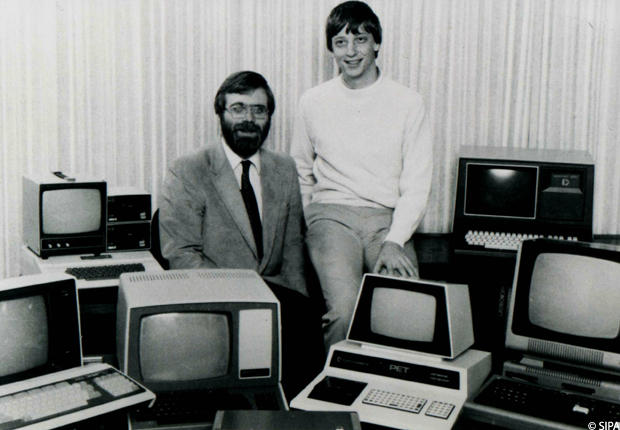MS Co-founder Paul Allen Bitter Towards Bill Gates
He has billions and a story to go along with them.
Paul Allen is the co-founder of Microsoft. He was there in the very beginning, when it was just him and Bill Gates. He was there when he came up with the name Micro-Soft as a marriage between microprocessors and software. Now, Paul Allen is telling his story in a book titled, "Idea Man: A Memoir by the Co-founder of Microsoft."
Vanity Fair has reprinted an excerpt from his upcoming book that gives Paul Allen's view on the early years. Some parts on Bill Gates aren't exactly the most complimentary, but the overall message is that he was an exceptional force behind Microsoft.
Here are some interesting bits on the interactions between Gates and Allen:
From the time we’d started together in Massachusetts, I’d assumed that our partnership would be a 50-50 proposition. But Bill had another idea. “It’s not right for you to get half,” he said. “You had your salary at MITS while I did almost everything on BASIC without one back in Boston. I should get more. I think it should be 60-40.”At first I was taken aback. But as I pondered it, Bill’s position didn’t seem unreasonable. I’d been coding what I could in my spare time, and feeling guilty that I couldn’t do more, but Bill had been instrumental in packing our software with “more features per byte of memory than any other BASIC we know,” as I’d written for Computer Notes. All in all, I thought, a 60-40 split might be fair.A short time later, we licensed BASIC to NCR for $175,000. Even with half the proceeds going to Ed Roberts, that single fee would pay five or six programmers for a year.Bill’s intensity was nonstop, and when he asked me for a walk-and-talk one day, I knew something was up. We’d gone a block when he cut to the chase: “I’ve done most of the work on BASIC, and I gave up a lot to leave Harvard,” he said. “I deserve more than 60 percent.”“How much more?”“I was thinking 64-36.”
Microsoft was a high-stress environment because Bill drove others as hard as he drove himself. He was growing into the taskmaster who would prowl the parking lot on weekends to see who’d made it in. People were already busting their tails, and it got under their skin when Bill hectored them into doing more. Bob Greenberg, a Harvard classmate of Bill’s whom we’d hired, once put in 81 hours in four days, Monday through Thursday, to finish part of the Texas Instruments BASIC. When Bill touched base toward the end of Bob’s marathon, he asked him, “What are you working on tomorrow?”Bob said, “I was planning to take the day off.”And Bill said, “Why would you want to do that?” He genuinely couldn’t understand it; he never seemed to need to recharge.
There was also another story about how Bill Gates and Steve Ballmer were trying to dilute Allen's equity in the company while he was out fighting cancer. Some of the tales told in the excerpt do vilify Gates somewhat, but Allen did write about their duo, "Our great string of successes had married my vision to his unmatched aptitude for business."
Although the book hasn't yet been released, Bill Gates has issued a statement about Allen's memoirs: "While my recollection of many of these events may differ from Paul's, I value his friendship and the important contributions he made to the world of technology and at Microsoft."
Get Tom's Hardware's best news and in-depth reviews, straight to your inbox.
"Idea Man: A Memoir by the Co-founder of Microsoft" is scheduled to go on sale on April 17. Read the excerpt here.
-
Thunderfox Bill's portion of the profits for BASIC should certainly have been proportional to his contribution to it, but the bigger question is about Paul Allen's contribution to everything after that. If he was still getting 36% at a point when he was doing substantially more for the company, that would certainly be unfair.Reply
But cry me a river, the guy is still a billionaire. He'll just have to make do with a few less billion than he might have had. -
blibba Thunderfox...the guy is still a billionaire. He'll just have to make do with a few less billion than he might have had.Reply
Quite! -
beayn He's complaining because he wasn't doing much of the work and didn't get a bigger share? He should have quit his job and worked full time in the company to maintain his higher share... it's his mistake, not Bill's.Reply -
Kaiser_25 Ya both have more money than any of us will ever have...BUT id rather them than some 'Paris Hilton' or 'Britney Spears', these guys at least contributed to our society.Reply -
atuk I agree with thunderfox, and yes he is still a billionair. He has got more than enough to last him his life at the same life style standards he has been enjoying. I would like to read the whole story though.Reply -
cookoy the quotes above don't reflect much bitterness in him. he just tell the stories as there were by his recollection. let the readers do the judging.Reply -
mitch074 could someone explain to me why, every time I log into this site, the comment I just entered is forgotten, forcing me to re-type it entirely?Reply
If I'm not mistaken, the time frame evoked is around the time Bill Gates was stealing CPU time from Harvard's mainframe, to program said BASIC, for an amount of more than $4000 (which was, at the time, a sizable sum). He was actually arrested, charged and kicked out of Harvard (he didn't actually drop out).
exacting taskmaster with a business sense or a greedy thief, one may wonder - probably a bit of both.

